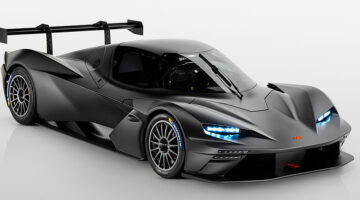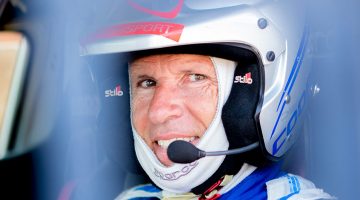crankandpiston sits down for a quick chat – in the main KTM showroom in Dubai, UAE – with three-time Dakar winner Marc Coma before his assault on this year’s UAE Desert Challenge.
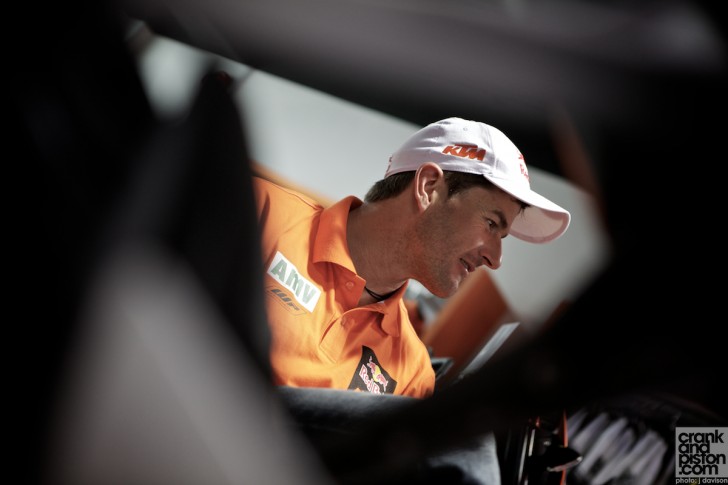
At the moment I’m sitting in a leather-backed chair, surrounded by seemingly every KTM product imaginable and attempting to do my best Michael Parkinson impression. You see, the gentleman sitting opposite me – and looking particualrly at home with the sea of orange around us – is three-time Dakar rally winner, Marc Coma.
The Spaniard, on a flying visit to Dubai en-route to Abu Dhabi, is competing in this year’s UAE Desert Challenge, and is keen to add to the six victories he has already secured on the event in the bike class.
So, grabbing a couple of Red Bulls and sitting down with the voice recorder, an incredibly smiley Coma explains to crankandpiston his thoughts on returning from injury, how painful missing this year’s Dakar really was, the key to desert riding, and why he’s not ready to retire just yet.
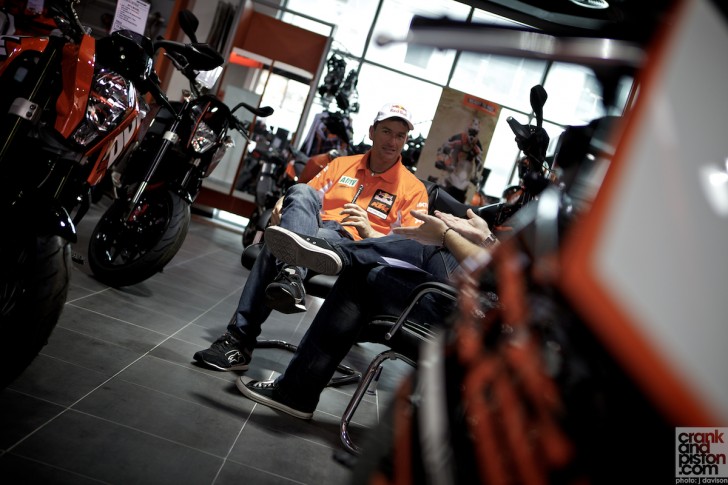
Marc, we may as well skip right to the main point. A ten-time Dakar rally competitor, and a three-time winner on the bikes. That’s a pretty formidable record…
“All my life I’ve worked for that! I’m obviously very happy to have achieved it, but I hope there’s still more to come.
“For instance this weekend I’m taking part in the Desert Challenge, which for me is a very special occasion. I’m coming back from a small…well, actually not so small injury! I missed the last Dakar this year because of it. But recovery has gone well, and I feel like a new rider. I’m full of energy ahead of the challenge.”
Your injury at last year’s Moroccan Rally made some headlines [an event at which Marc, during the third stage, somersaulted over his handlebars after hitting an unsighted clump of sand and dislocated his shoulder, withdrawing from the event as a result]. That certainly wasn’t the greatest way to end 2012…
“It actually wasn’t a big injury, but it was enough for me to have to stay at home and spend time recovering. The injury didn’t look too bad, but then after a month and a half, the doctors discovered that one muscle didn’t work – the deltoid wasn’t working – and there was some problem with the nerve. And there was nothing really we could do. You have to give the nerves time to recover. There are no pills, no physiotherapy, no operation. You just have to wait.”
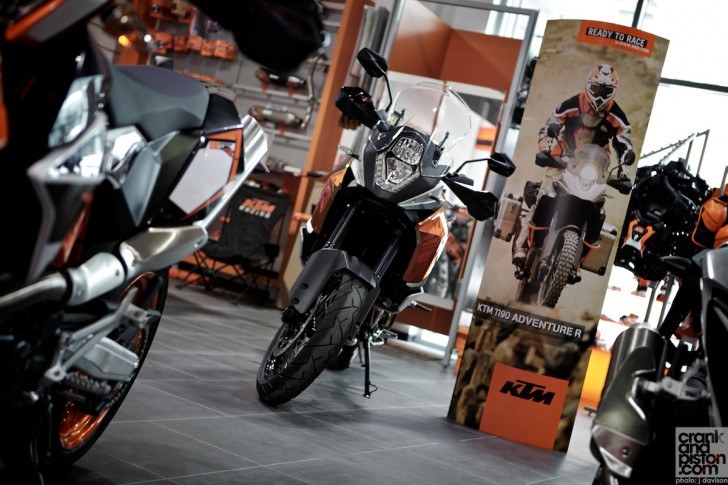
And it was down to that injury that you had to miss this year’s Dakar rally…
“Yes. That was not an easy decision to make, but after we saw the damage that had been done, my team and I were 100 percent convinced it was the right decision to make. My shoulder was not strong enough to make the whole of the Dakar. It’s one of the hardest races in the world, and you have to be fully fit to do it.
“It was the worst moment…maybe not the worst moment, but it was definitely one of the difficult decisions I ever made. I want to be in the Dakar, but at the same time I want to be fair and honest both to myself and my family and fans. If I was to start the 2013 Dakar in the condition I was in, it wouldn’t have been fair to anyone. I knew before the race that I wasn’t in any condition to fight for victory, and just driving to the finish would have been tough.”
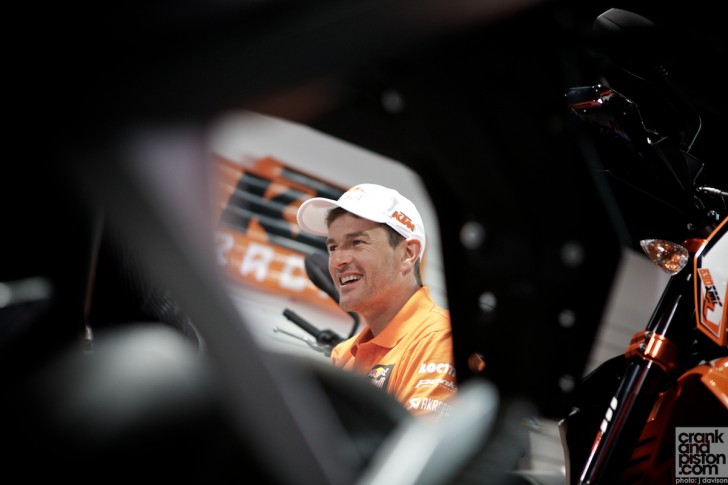
How frustrating was the recovery period, knowing that all you could do was wait for the muscle to repair itself?
“Interestingly there was two different moments. Before the Dakar we pushed really hard to make the event, to try and arrive with the shoulder partly recovered. This was the main goal before the race. But when we accepted that I would not be competing, we changed the plan completely. I thought, ‘okay, now we have time to recover 100 percent’. We didn’t have to push, and from then on it was just important to make sure I was fully healed.”
To add insult to injury, your KTM teammate Cyril Despres – who you’d been fighting with for victory in Morocco before the accident – took his fifth win at the Dakar. How tough is that to take, knowing that Cyril’s victory could have been yours?
“For one moment, I think it’s a pity that I wasn’t there and fighting. But my 2013 Dakar was gone before it had even started, and for me that was the important switch: I don’t want to be…making loops in my head, you know what I mean?! I wasn’t there, nothing can change that, and so I just look ahead to the next rally.”
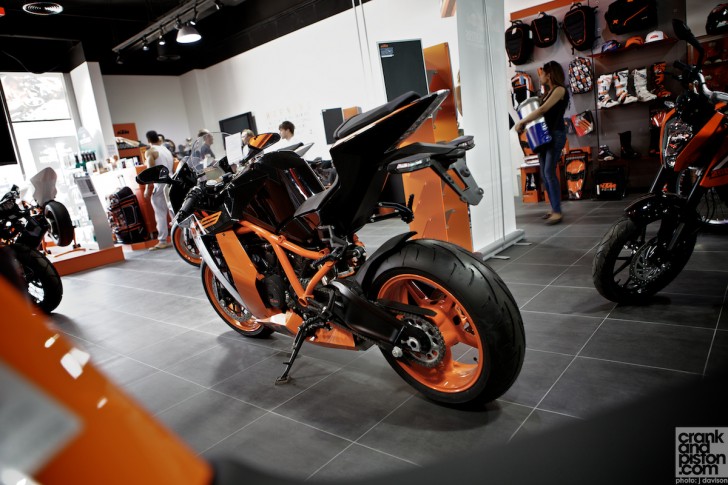
Despite the obvious highlights the Dakar has given you over the years, this year wasn’t the only low point. The 2010 event stands out. Having won five of the stages early on, you were penalised for an illegal tyre change during the seventh that cost you six hours and any hope of victory [Marc would eventually finish 15th]. How does something like that compare to not competing at all?
“[Pauses] You know, I’ve competed in the Dakar ten times, and in those ten years each one has been completely different: some years everything goes well and you’re at the front fighting for victory; another year you crash two stages before the end of the event and it’s all over; another year you get a penalty. And I’ve experienced all of those! Now I can say to myself, ‘okay, I have ten years of experience, I know all the situations, and I’m comfortable with that’. But every year there seems to be something new!
“Of course, for the mental side – in 2010 – it was not easy. It was very, very tough actually. But with the Dakar I have some very nice moments, and so I prefer to think about those!”
Did the events of the 2010 rally make your third Dakar win in 2011 any sweeter?
“Yeah. Always, to be at the end of the Dakar and have the victory is just….I mean, many things need to be in order for you to win. It’s very easy for some things to be working well, but to have everything working perfectly is what makes the difference. So in that respect, every victory is special!
“But the third one was such a relief after 2010: it was like the sting had gone! It was a really great feeling. Looking back, the 2011 victory – and my first win in 2006 – feel all the more important, knowing now what we’ve been through.”

